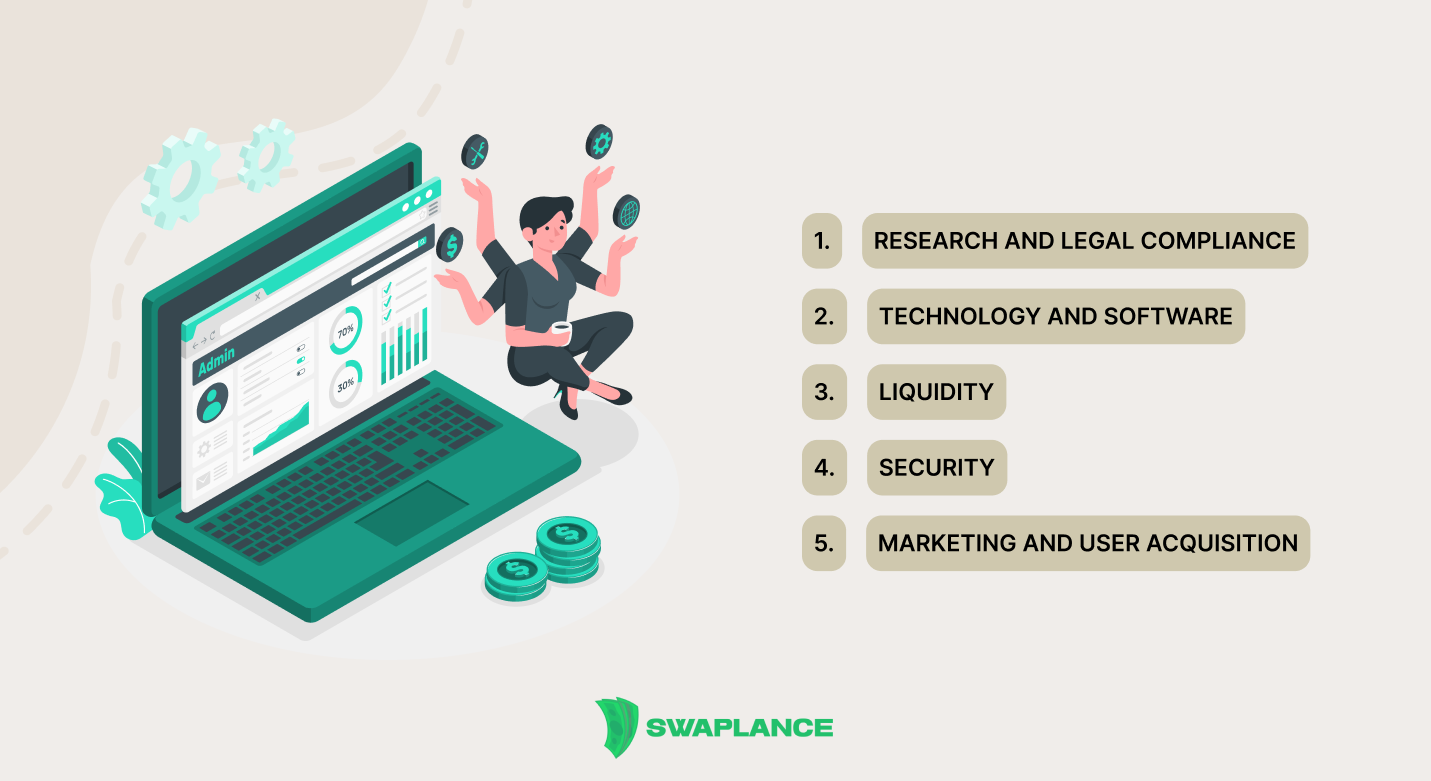
What is a Crypto Exchange? Understanding the Best Platforms, Fees, and How to Start Your Own
Have you ever wondered how many cryptocurrencies exist? A few hundred? Maybe a thousand?… Well, try over 7,000 according to CoinMarketCap. With so many to choose from, you might want to try out new cryptocurrencies. But how can you go about it?
Well, good news! You can try out another cryptocurrency simply by making an exchange. Exchanging is the process of exchanging one crypto asset you already own for another.
Let's say you have some Ethereum but want to get some Bitcoins instead. Certain services can help you with that. Thanks to exchange providers, you can exchange your Ethereum and get Bitcoin of almost the same value in return.
What is a Crypto Exchange?
A crypto exchange is an online platform that allows users to buy, sell, and trade various cryptocurrencies, such as Bitcoin, Ethereum, and others. These exchanges function similarly to traditional stock exchanges but facilitate the trade of digital assets. Users can exchange one cryptocurrency for another or trade cryptocurrencies for traditional currencies like USD, EUR, or GBP. Crypto exchanges come in two main forms: centralized and decentralized. Centralized exchanges (CEXs) operate under the management of a company that oversees transactions and provides security features, while decentralized exchanges (DEXs) operate through blockchain technology, allowing peer-to-peer trading without intermediaries.
Crypto exchanges play a critical role in the crypto economy by providing liquidity and access to cryptocurrency markets. Famous examples include Binance, Coinbase, and Kraken, each offering a variety of services, including advanced trading tools, low fees, and user-friendly interfaces.
Which Crypto Exchange Has the Lowest Fees?
When evaluating which crypto exchange has the lowest fees, it’s important to consider the structure of trading costs, including transaction, withdrawal and deposit fees. Binance is often cited as one of the crypto exchanges with the lowest fees. It offers a tiered fee structure that can be reduced further if users opt to pay trading fees with Binance Coin (BNB), the platform's native cryptocurrency.
Another option is Kraken, which also offers competitive fees and volume-based discounts. For frequent traders, Kraken and Binance provide cost-effective solutions with reduced trading fees for higher-volume transactions. Additionally, KuCoin and Bitfinex are known for their low fees compared to other platforms, particularly for margin and futures trading. Comparing fees across exchanges is essential since the cost can impact profitability, especially for active traders or those dealing with large volumes.
What is Coinbase Crypto Exchange?
Coinbase is one of the most popular and user-friendly cryptocurrency exchanges in the world, particularly in the U.S. It was founded in 2012 and is known for its easy-to-use interface, making it accessible to both beginners and experienced traders. Users can buy, sell, and trade a variety of cryptocurrencies like Bitcoin, Ethereum, Litecoin, and others. Coinbase also offers a mobile app for convenient on-the-go access.
Coinbase is divided into two main platforms: Coinbase, the standard platform for retail traders, and Coinbase Advanced Trade, which allows traders to trade more than 550 cryptocurrencies and 237 USDC pairs with low fees and the full suite of tools Coinbase offers and provides more advanced features like charting tools, order books, and lower fees for high-volume traders. Coinbase also ensures regulatory compliance and robust security, making it one of the most trusted platforms in the industry. However, Coinbase's fees tend to be higher than those of competitors, especially for smaller trades.
What is the Largest Crypto Exchange?
When asking what is the largest crypto exchange, Binance consistently ranks as the top crypto exchange globally based on trading volume, liquidity, and the number of available trading pairs. Binance offers a vast selection of cryptocurrencies for trading, including spot trading, futures trading, and various staking options. Its ability to handle high transaction volumes and low fees makes it attractive to users around the world.
In addition to being the largest by trading volume, Binance offers a comprehensive ecosystem of products and services, including its own blockchain (Binance Smart Chain), decentralized exchanges (DEX), and a range of financial products like loans and savings accounts. Coinbase follows Binance in terms of active users and market share, especially within the U.S., while other significant exchanges like ByBit and Kraken hold large shares of specific market segments.

How to Start a Crypto Exchange
To understand how to start a crypto exchange, it is important to realize that launching a successful exchange involves several key steps:
- Research and Legal Compliance: Understand the regulatory environment for cryptocurrency exchanges in the region you plan to operate in. Different countries have varying regulations regarding crypto trading. Compliance with anti-money laundering (AML) and know-your-customer (KYC) standards is essential.
- Technology and Software: Secure a robust and scalable platform to handle trades efficiently. You can develop your own software or use a white-label solution, which allows you to use pre-built, customizable exchange software.
- Liquidity: A successful exchange requires liquidity to facilitate trades. This can be achieved by partnering with other exchanges or creating market-making strategies to ensure users can trade without delays.
- Security: Implement strong security measures, including two-factor authentication, encryption, and cold storage for funds. Security breaches can destroy the credibility of an exchange, so investing in cybersecurity is crucial.
- Marketing and User Acquisition: Launching an exchange requires attracting users, which can be achieved through various marketing strategies, including referral programs, partnerships, and advertising campaigns. Offering competitive fees and a user-friendly interface can also draw in more traders.
Swaplance platform can connect you with freelance experts who can help you launch your own cryptocurrency exchange, offering everything from technical development to regulatory advice.
Starting a crypto exchange requires significant capital investment, technical expertise, and ongoing maintenance. Still, with the right team and resources, it can be a profitable venture in the rapidly growing cryptocurrency market.
In conclusion, understanding how crypto exchanges work, comparing platforms, and researching the costs and legal requirements involved is crucial for those looking to get involved in the crypto economy, whether as a trader or as a business owner. Crypto exchanges remain central to the success and growth of the cryptocurrency industry.
Common questions
-
What factors should I consider when choosing a crypto exchange platform?When choosing a crypto exchange platform, consider factors such as security, including measures like two-factor authentication and insurance for stored assets. Fees are also critical, as they vary between exchanges and can affect your profitability – especially trading, deposit, and withdrawal fees. Look at user experience and ease of use, particularly if you're a beginner, and whether the platform supports the cryptocurrencies you wish to trade. Lastly, evaluate the liquidity of the platform, which impacts how easily and quickly you can execute trades at your desired prices.
-
What are the typical fees associated with using a crypto exchange?Typical fees associated with using a crypto exchange include trading fees, which are either flat or based on a percentage of the transaction amount, typically ranging from 0.1% to 0.5% per trade. Deposit and withdrawal fees can also apply, with some exchanges charging for bank transfers, credit card payments, or cryptocurrency withdrawals. Additionally, spread fees might be charged, which represent the difference between the buy and sell prices. Other costs can include network fees for processing transactions on the blockchain, which vary based on congestion. Some exchanges also have inactivity fees or higher fees for using certain payment methods.
-
What are the steps to starting my own crypto exchange?Starting your own crypto exchange involves several key steps. First, conduct market research to understand the legal requirements, competitors, and target audience. Then, secure the necessary licenses and compliance certifications, which vary by jurisdiction. Next, you'll need to partner with reliable payment processors and establish strong security measures to protect user funds and data. The next steps involve choosing or developing exchange software, either through white-label solutions or custom development, and setting up liquidity to ensure smooth trading. Lastly, launch your platform and focus on marketing and customer support to attract users and maintain growth.
 Mark Petrenko
Mark Petrenko 




